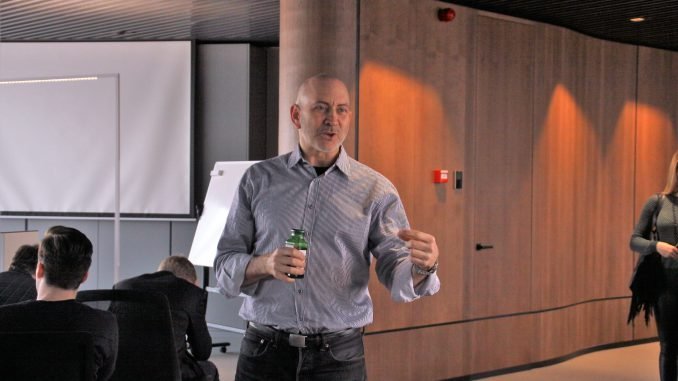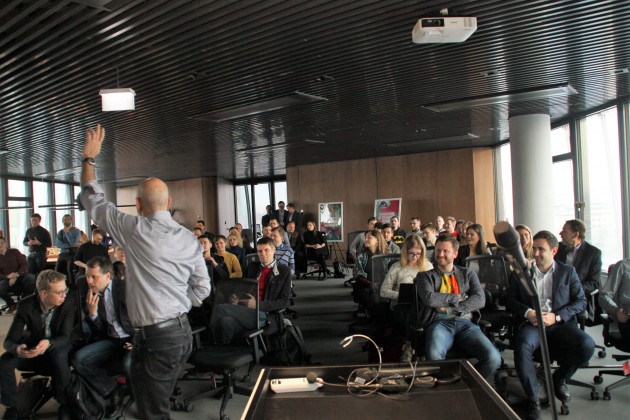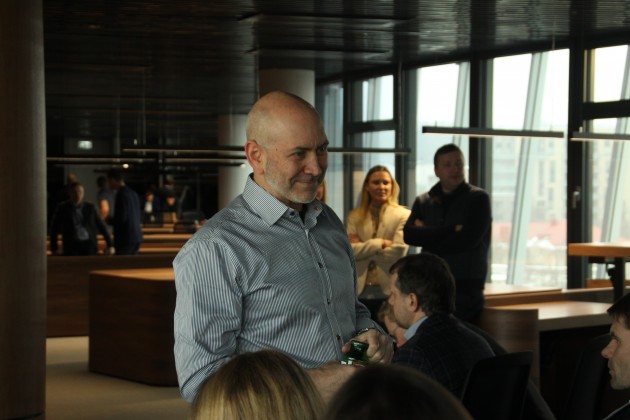
Just give the blockchain technology some room to develop, relax regulations and the future will reach you sooner, he suggested to the minister. The minister of economy is fairly progressive and supports the blockchain technology; he would like to move things forward without breaking too much, but I am better at “breaking things,” Siegel said after the meeting. Read the interview about the potential of blockchain, the Pillar Project and its partners, as well as Blockchain Centre Vilnius and the planned #PillarUnconference 2018, which will take place in Vilnius this July.
You just came back from a meeting with the Minister of Economy, so what are your impressions and what have you decided?

David Siegel: Oh it was not a decision meeting, it was a nice meeting so it was a very good exchange, and he’s pretty progressive actually, very pro Blockchain. He’s frustrated as I am that people think of Blockchain as crypto currency, shady drug type thing, when its actually this way to change the world, kind of like a shared IT department, you can almost get rid of your IT department.
It saves the whole world a tremendous amount of repetitive white-collar work, we can all see the promise of this, now it’s okay we can go step by step and as he was saying, you have to carefully introduce it to people and keep moving things forward without breaking too much. I’m better at breaking things probably than he is, he’s got to be more careful than I do. I think both of us are eager to move the Blockchain agenda forward, both in Vilnius and the EU in general.
Okay so how do you see that, it was exactly one month ago since the Blockchain center in Vilnius opened, so how do you see the grow of Lithuania?
We want to help fill up the Blockchain intervention centre with Blockchain interventions, we’re starting next week. We’ve got a couple project managers and architects on the way here, think they are somewhere around here today and they are viewing people.
They will meet developers and we’ll fill up some of those desks upstairs, with at least, our goal is about 10 people in the short term and by the end of the year about 20 developers here. This will be our 2nd development center, we’re opening another one in Israel right now, so our Pillar Project is expanding a lot. We’re developing our core product in London, and this the next generation product will be developed here in Vilnius.
Okay you almost answered to my 2nd question about your expectations from corporation with the newly opened Blockchain Centre Vilnius, because Pillar Project is one of the partners, so what other expectation, has it been good cooperation so far?
We just decided, just after they came back that hey let’s do it, let’s commit to Vilnius and get over here and start hiring and make it happen. So that’s pretty good for a month, to put in place a team and an action plan to build up here.
We’re also committing to Vilnius in a couple of other ways, after that meeting we decided we’ll be having our general meetings here at the Grand Resort, and that will be July 15th – 22nd. We’ll be bringing Pillar people in from around the world, for 7 days of Blockchain craziness or T-shirts, parties and music and lots of learning, and the learning will be for technologists, for entrepreneurs to build their businesses on our wallet platform.

Also business people to understand that this platform will be widely distributed and something that many of their clients will start to have so they can take advantage of it, and then for government, because our wallet is like the ideal vehicle for people to interact with government services, we’re building it specifically for that.
Also for academics and students to come and learn, that’s a week of intense workshops, talks, discussion sessions, and presentations of people from around the world. The weekend before that, Saturday the 14th of July, we’re putting together a one day event here in Vilnius, for the Lithuanian population, so before all the people arrive at the airport from everywhere else, we’re doing a one day event here for the locals.
This is to educate people about Blockchain, and especially people who don’t know much and are interested, business people who are hearing about this and are finding out that it’s not just for drug dealers, and that it is actually legitimate technology that might become very precedent over time. We want to educate them and we want start-ups and companies here, even government companies here that have a demo, a Blockchain demo to come and show what they’re doing, and that’s just a gift to the people of Vilnius and Lithuania to get things going. They will also be able to plan what they’re doing in the following week and jump in with us, and the conference is free, all these events are free, we pay for the conference, all you have to do is show up.
This is amazing, so it’s a completely open.
Yeah its open for everybody, we’re really going to engage the Vilnius community and help put Vilnius on the map in the Blockchain world and also in the business world. It’s hard to make it through one hour of television now on the BBC or CNN without hearing something about crypto currency, and we’re here going to be part of that.
Looking at Lithuania, what else should we do in order to become this centre of Europe?
Yeah just do what Belarus is doing [laughing], just make it totally legal and not no tax, and make it a tax haven so that anybody who’s got crypto anything can just come here and pay no tax, okay well maybe that isn’t going to happen but so what can they do.
You know relax, the requirements to take the new technology and stuff it into the old regulations, we are all facing regulatory risk across the board in this industry. Nobody wants to go to jail, nobody is money laundering, a small number of people, there’s less money-laundering happening on the Blockchain than there is with cash, on a percentage basis it’s less.
We just want to work with regulators to let us try things and see if we can invent a new world, eventually probably the entire old world will come into. We will eradicate cash like it’s a virus, that’s a good thing to get rid of cash, cash is how you do the money laundering and makes things unsafe.
But crypto currency is not electronic money is it.
Well depends but what if we had crypto euros, what if we had euros as tokens and we got rid of these paper things and metal things, and we had a real crypto money supply and it was possibly even managed by a better smarter way to manage money supply than they do at the ECB.
We could have an entirely new economic platform for that and it will all be this new world that we are creating, go easy on us, we’re experimenting and there’s going to be some destruction but there’s a lot of destruction in the normal world right now. What regulators are supposed to do is protect people and there’s a lot of people not being protected right now, so we are hoping that through experimentation and evolution, we’ll get to a world that is safe for everyone.
I had an impression that Blockchain community would like to, kind of distance themselves from the crypto currency, and emphasize a message that there’s much more than crypto currency in the Blcokchain, is this still the case?
Absolutely, so Blockchain has promised to disinter mediate and make it so that people can do business with each over without all these intermediaries. That’s everywhere, why can’t you buy an airplane ticket, and if you don’t want it, why can’t you trade it to someone else, why can’t there be an airplane ticket exchange?
Why can’t we do insurance without having regulated insurers, with licenses in the middle of it, and licenses are great for the insurers because it makes it so much harder for people to challenge. If I can send you Euros from my phone to your phone for like nothing then that replaces a lot of what banks do. But banks and businesses are making money, if you look worldwide, banks last year had more than a trillion dollars of profit, profit that we all pay for, just to run this insecure banking system that is slow and leaky.
We have better technology than that, so Blockchain is for much more than money, Blockchain is how you’ll track delivery of things like diamonds or drugs, vaccinations and vaccines around the world have to be tracked and they have to be monitored for their temperature and things like wine.
All kinds of things that are moving around the world in containers can be tracked using Blockchain, data of all kinds can be tracked, and your health data should be on Blockchain, that’s what Pillar Wallet is for. You will put your personal assets and your personal data on the Pillar Wallet and then you go to a doctor’s office and the wallet can see, it can interact with it.
We have self-driving cars, why can’t we have self-driving data, the wallet says, oh you’re in a new doctor’s office your appointment is confirmed, would you like me to give them data that would be most appropriate for this particular doctor? Yes. You’re done, you’re registered there’s no 3 pages of stuff to fill out about your medical history, it’s all done. Then when you leave the doctor the thing might say do you want them to keep this data or do you want to take it back?
Oh I’ll take it back, I’ll go see someone else, I’ll have it, I’ll keep my personal records. Facebook won’t have it, Microsoft won’t have it, Google won’t have it, and I’ll have it.
That sounds like a new brave world to me.
Yeah and it’s very possible that all the stuff we’re creating now will eventually just over time be this new frontier that everything will go to the other side.
By 2030?
Well that’s the idea, the new frontier work we’re doing now will be mainstream by 2030, so yeah we could hit the tipping point in 13 years, 12 years now.
